If reports are anything to go by, it took Ethiopia Just A year to make its Naval Force ambition a reality. The first announcement of intent by Ethiopia’s PM, Dr. Abiy Ahmed, came in April 2018. Since then, Ethiopia – a land locked country – has, so far secured a major political support from Word super powers, military assistance to set up the near to none existent Naval Force and Financial Commitments. It has also secured a spot for its Naval Force base, though is tight lipped about the location, indications are it is to be at Massawa, the port in Neighboring country Eritrea.
“If reports are anything to go by, it took Ethiopia Just A year to make its Naval Force ambition a reality.”
The intention to Re-construct its Naval Forces, which seized to Exist after the independence of Eritrea in 1993, has caught many by surprise – even the Ethiopian people themselves. Ethiopia is a one of the 46 Land-locked countries in the World. Those countries are said to have a total population of approximately 400 Mil, with Ethiopia – population of more that 100Mil – taking the biggest share. With the population growing rapidly, the Prime Minister’s argument that Ethiopia will need more ports and a Naval Force to secure its interests seems to convince his critics. At least, at a glance.
Ethiopia owns not more than 10 commercial ships and is utilizing the port of Djibouti for its access to the sea. This particular access to Port Services, coupled with the Chinese funded Road & Rail access between the two countries, is so far proving efficient for Ethiopia’s needs. Only Six (6) Bulk ship Imports bound to Ethiopia docked at Djibouti Port, according to The Ethiopian Maritime Affairs Authority’s Shipping Snapshot 1-28 February 2019. Many are still questioning this mysterious logic behind the Naval Force, considering None of those Ships docked at Djibouti for these imports, for example, were owned by Ethiopia.
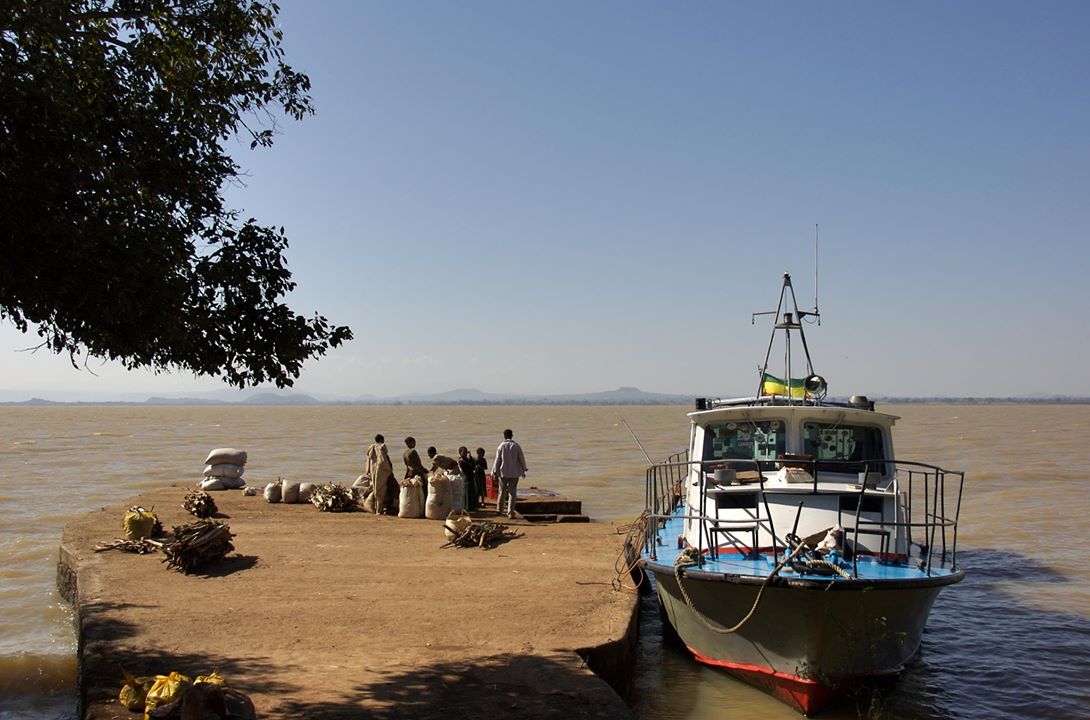
The only remaining of its Ethiopian Navy Military ships, the GB-21 patrol boat is seized with rescue and patrol operations at Lake Tana.
As reported by Eritrea Watch, (Eritrea Absent At IGAD, Ethiopia Chairs Red Sea Security.) , Ethiopia is actively consolidating all the regional political support for its ambition. It is chairing the IGAD Ministerial gathering aimed at looking ways of securing the Red Sea and Gulf of Aden. The Ministry of Foreign Affairs Bulletin for the first week of April, covered on the task force meeting in Kenya. The task force will produce the final recommendations to IGAD for Approval and Deliberations.
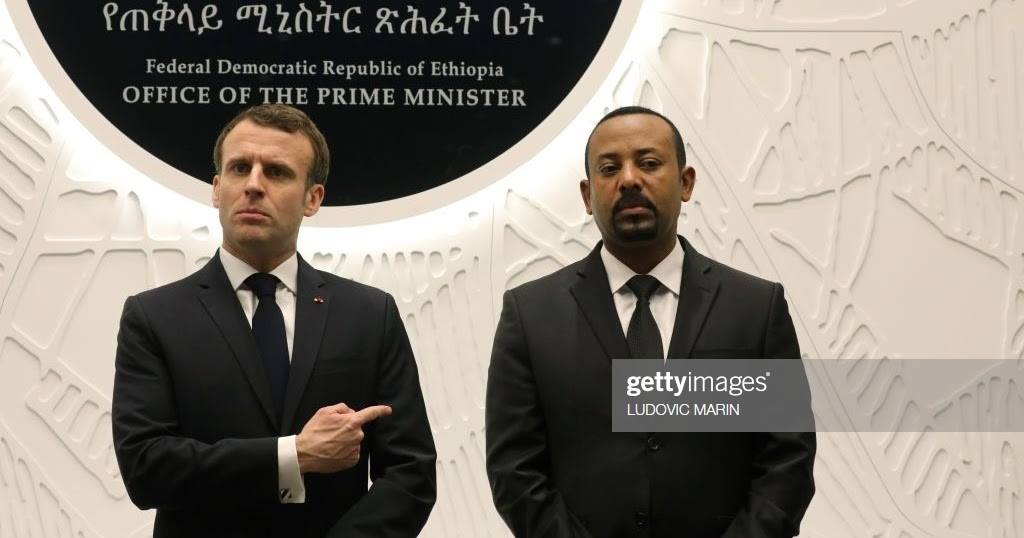
Ethiopia and France agreed their first military cooperation accord on Tuesday, a deal that includes helping the landlocked nation build a navy, as Paris seeks to boost economic ties in Africa’s second-most populous country.
America and France, among the many superpower countries are pledging their support for the Reconstruction of the Naval Force. In march France and Ethiopia signed an agreement that would see France train, supply with logistics and Finance Ethiopia’s Ambition.
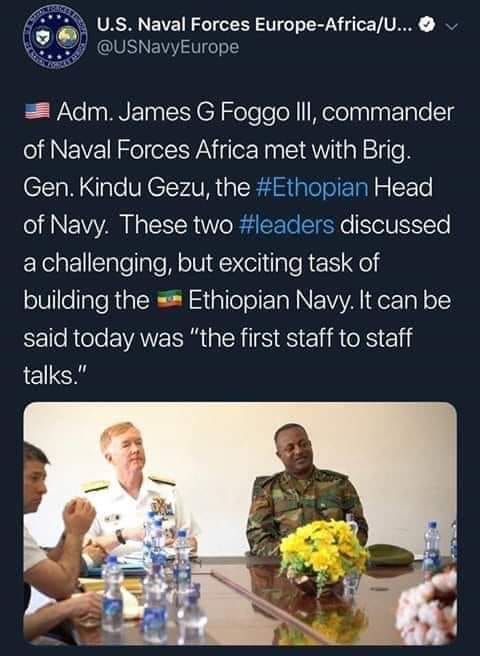
In April, the USA sent the US Naval Forces Europe – African commander to meet the new Ethiopian counterpart, Brig. General Kindu Gezu. The Brig. General, previously an instructor at Ethiopia’s Military college has no previous Naval experience. As of 2019, Ethiopian Navy inventory only includes One boat – the only remaining of its Military ships, the GB-21 patrol boat is seized with rescue and patrol operations at Lake Tana.
Eritrea’s Dilemma
The ambition, intention – and now the plan of action to reconstruct the Naval Force seems to come at long term price to Eritrea. Ethiopia, and all other countries involved in supporting the ambition – politically, logistically and financially, refuse to disclose the location of the said Base.
Djibouti, which many would believe, is the most convenient country to house Ethiopia’s Naval Force, is home to many countries Naval Forces. USA, France, China, Egypt, Japan all have military presence in Djibouti. The self declared country, Somali Land seems keen to be the host, though its intention is more of a political gain of Recognition as country. For Ethiopia, recognizing Somali Land would bring it condemned by the other Somalia. Somalia, the other option, has mended its relations with Ethiopia. Ethiopia is now in charge of the Peace keeping mission – AMISOM. Somalia’s Federal Government is entangled with a prolonged security threat from Al-shabab, a group threatening to overthrow the Government.
“This has led many to believe the intended - and by all arguments the most convenient – Base would be in Eritrea.”
With a deal Initiated and agreed to by the PM of Ethiopia, Dr. Abiy Ahmed, to get funds from European Union, Italy and the World bank , work is in progress to build road & railway connections between Eritrea and Ethiopia. The two ports in Eritrea, Massawa & Assab would soon connect to other Ethiopian cities. This has led many to believe the intended - and by all arguments the most convenient – Base would be in Eritrea.
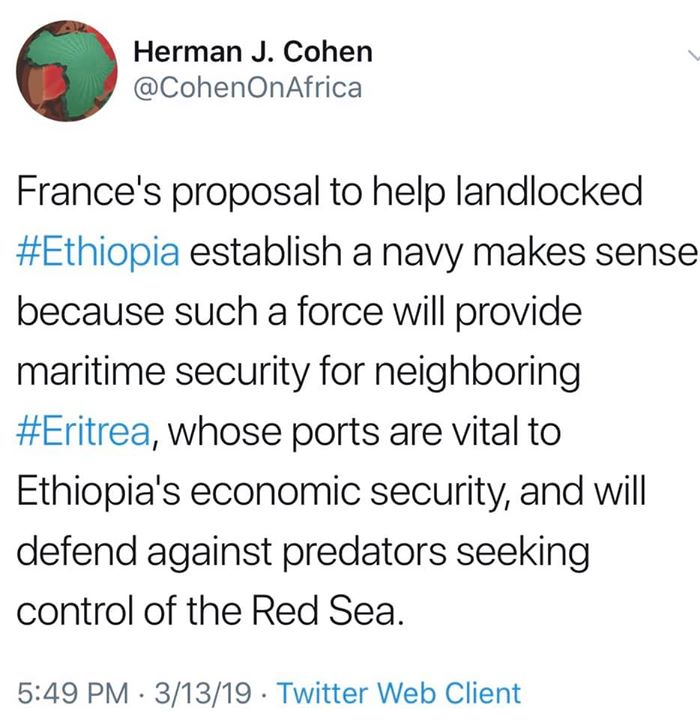
A long time ally and adviser of the Ruling Party in Eritrea, US citizen Mr. Herman J. Cohen, communicated in a tweet the importance of Ethiopia having its Naval Force re-constructed. He explains Ethiopia could now protect its interests in the Red Sea and the shores of the Neighboring country Eritrea. This message could be the closest one could get in determining the attitude of the secretive Ruling Party - PFDJ - in Eritrea regarding the development.
But, Eritrea too has its own Naval force, and the two countries are historical arch-enemies, that only managed to mend their relations by signing a Peace Pact in July 2018.
Eritrean People Dilemma:
While Ethiopia managed - supposedly – all its preparations in Less than One year, the Eritrean Government is woefully quite on its agreements with Ethiopia. The full content of the Peace Pact signed between the two countries in 2018 is yet to be disclosed. Many Eritreans are now left to wonder about the status of the Eritrean Navy itself. The logical and sensical question Eritreans are asking is, would it not make sense to develop the existing Eritrean Force than start from Scratch that of Ethiopia?
What was supposed to be stronger and more equipped - than the Ethiopian one patrol boat counter part – Eritrean Naval Force is in tatters. As reported by Eritrea Watch before – Commander of Eritrean Naval Force: under Arrest? – sources who do not want to be named confirmed the arrest of the Commander of the Eritrean Naval Force General Hummed Ahmed Karikare. The latest meeting of Naval force commanders held in Massawa, in April 2019 – contents of which are still unverified - was chaired by the Deputy Commander. As of 2019, inventory for Eritrean Naval Force includes about six (6) medium sized naval ships, numerous high speed patrol boats and thousands of trained army personnel.
“What was supposed to be the stronger and more equipped - than the Ethiopian one patrol boat counter part – Eritrean Naval Force is in tatters.”
Sources disclosed to Eritrea Watch, in what seems to be a deliberate act the Eritrean Naval force has been on a gradual decline for the past few years. More than half of its fleet have been docked for maintenance for years. In the years 2010 -2016, half of its military personnel were re-assigned to the Country’s Ground Forces Army. By 2018, the Naval Force training facilities at Gedem was near collapse, owing to shortage of fund and skilled man power. An SBS Tigrigna interview with a former Eritrean Navy personnel, explains the frustration with the Government’s commitment for funds and lack of will to improve the Naval Force. Many claim, the President of Eritrea Isayas Afwerki, showed NO interest in fostering the capabilities of the Eritrean Naval Force.
“Eritreans are totally dismayed at their Government’s lack of interest and, disengagement in the latest developments of the region.”
Eritrea has an extensive 2,234km coastline, 1,151km of it coming from its mainland and 1,083km coming from its 356 islands on the Red Sea, which is the 6th longest coastline in Africa (Wallace and McKeehan, 2006), Eritreans are totally dismayed at their Government’s lack of interest and disengagement in the latest developments of the Region.
Regional Dilemma:
Politically, Eritrea’s Government has been boycotting all regional and international conventions that dealt with the issue of the Red Sea security matters. It has , for some unknown reason, decided not to be part of the ongoing IGAD initiative for Red Sea and Gulf of Aden Security task team, leaving Ethiopia to chair the group. The Saudi Arabia Initiated Red Sea Bloc – consisting of 6 countries bordering the Red Sea - has not included Eritrea in its past deliberations. So far, Eritrea has missed two crucial convention of the Bloc.
In explaining the motive for the formation of the Bloc, Saudi Arabia states “This is part of the kingdom’s efforts to protect its interests and those of its neighbors and … to stabilize the region that we live in and to try to create synergies between the various countries…”. Interestingly, the word ‘Synergy’ would feature in the 2018 Peace Agreement documents signed between Eritrea and Ethiopia, as signed in Saudi Arabia.
“Eritrean People worry, all the recent developments in the region is putting their countries Stability and Sovereignty in danger.”
Eritrea is officially part of the War in Yemen. It has sided with the Saudi Arabia – UAE coalition. Though still in denial, the UAE has leased the port of Assab for thirty (30) years, in 2015. UAE is using Assab port & airport facilities to conduct air strikes in Yemen. Aljazeera News, recently covered how UAE is using Assab as a prison ground for Yemeni rebels, with accusations of torture labelled against it.
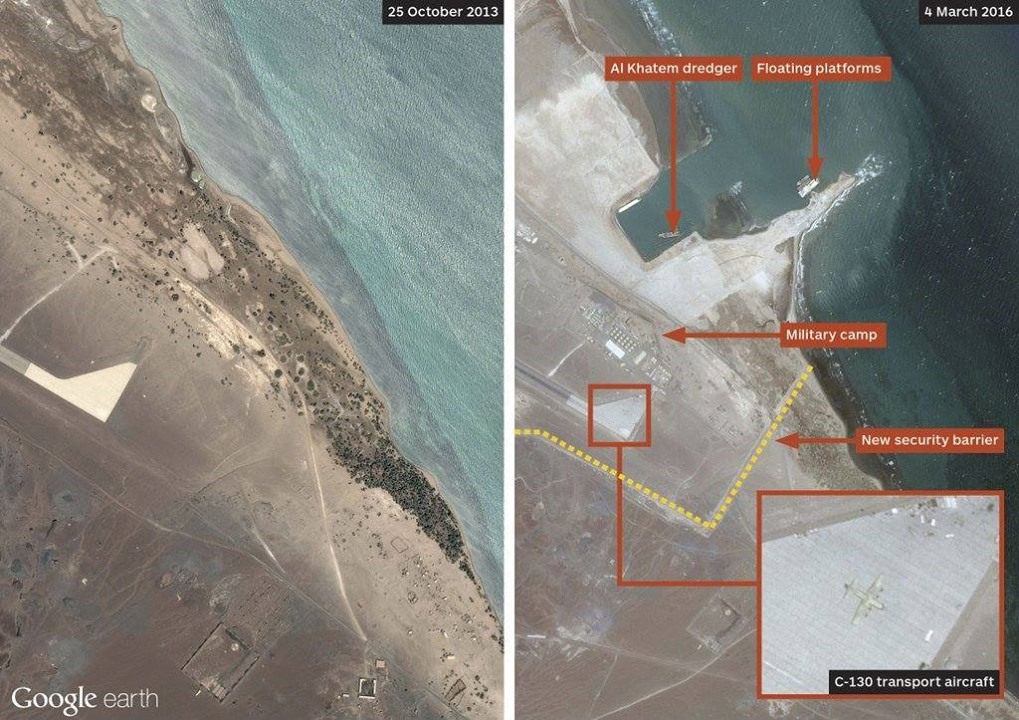
UAE Base in Assab, Eritrea
Eritrean People worry, all the recent developments in the region is putting their countries Stability and Sovereignty in danger. The aggressive ambition for Naval Force by land-locked Ethiopia, the total disregard of Eritrea’s regional interests by the Red Sea Bloc lead by Saudi Arabia, the total control of the port of Assab and the country’s Southern Red Sea region – to the detriment of the Afar community’s livelihood And – worst - the Total Silence and lack of Responsiveness and Capacity by the Government in Eritrea, ALL brings about a mixed emotions and memory to the Eritrean People.
Eritreans worry if the trend is very similar to the situation in Yemen. Is Eritrea the - Next - Yemen in the making?
The reason is that president Iseyas afewerki has Ethiopian origin and had a vision to unite Eritrea with Ethiopia. But the ongoing plan will lead to havoc and instability in the region.
All entities, whether regional or international, should treat Eritrea as an independent sovereign country. Period. They should negotiate in good faith to secure the regional security, prosperity and the dawn of democracy in the region. How many more people do we have to loose because of war, poverty and selfishness? Anything else will only lead to disaster. The region should not go back to where it was. LET US MOVE ON TO A BRIGHTER FUTURE. WE CAN DO IT. 🇪🇷🇪🇹☮️✌️😍😎